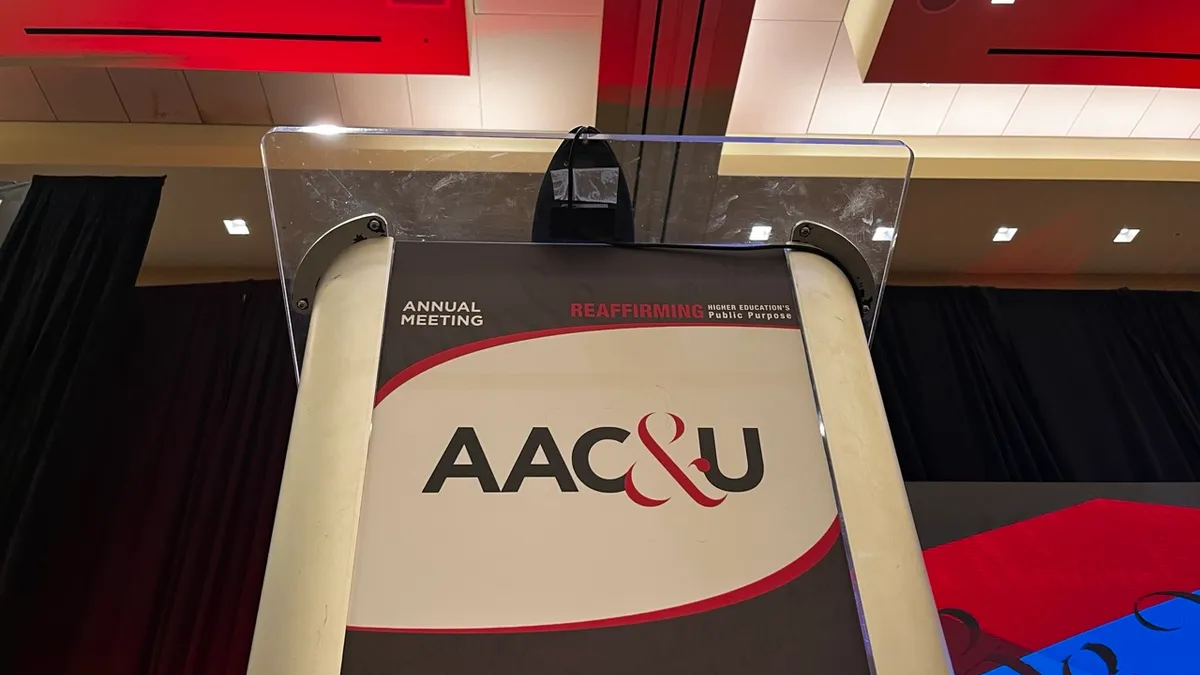AURORA, Colorado — Call it the Great Resignation or the great realignment, reshuffle, reevaluation or something else. Tight labor markets and worker turnover are worrying college leaders.
That was clear this week at the National Association of College and University Business Officers' annual meeting, where many conversations and session after session touched on attracting and keeping employees to ensure smooth operations and bolster colleges' bottom lines.
Reasons floated for employees leaving will look familiar to anyone paying attention to the larger narrative on the Great Resignation: burnout, low compensation, lack of remote or hybrid work options. Workers might want to move to another state, or they might not see any opportunities for upward mobility at their current campus. They might feel disrespected at work. They might have trouble finding child care to allow them to keep doing their jobs.
Feeding it all, inflation is high, and paychecks might not be keeping up. Political unrest also places pressure on relationships.
Campus leaders are turning over quickly, many colleges face budget constraints for the foreseeable future, and good employees are getting offers from rival colleges or other sectors.
"I don't think people are just quitting," said Helena Rodrigues, vice president and chief human resources officer at the University of Arizona, during one conference session. "I think people are considering their options."
How can colleges compete in a job seekers' market?
Even if pressures like inflation ease, many experts are skeptical that higher ed will go back to the days of having more strong job candidates than positions to fill. It's a job seekers' market, they say, and it very well might be for the foreseeable future.
Most colleges have never been able to compete with for-profit organizations solely on pay. Instead, they've been able to sell themselves as mission-driven organizations that can also attract employees with good health insurance and retirement savings packages.
But colleges aren't the only mission-driven or socially responsible employers out there. And they might not be able to rely on the perks that attracted workers in the past. Today's younger employees are paying off student loans or struggling to enter the housing market. Others are worried about elder care or child care — or both.
At the same time, people are saying they're done with work that feels like drudgery, said Allison Vaillancourt, vice president and senior consultant at human resources and benefits consulting firm Segal, during a conference session.
"If we're never going to win the war on pay, what can we do to make sure that our employees don't want to leave?" said Vaillancourt, formerly a vice president for human resources at the University of Arizona. "The key message is that your employees expect more from the workplace, from their work, and from you as leaders."
Other questions raised in sessions throughout the conference: Are campuses ready for employees or whole teams to be poached based on whether they can work remotely? Are they prepared to hire quickly so they don't lose job seekers to competing offers from employers in other sectors? Can they simplify search committees or application processes to make them less daunting? Are they willing to rethink degree requirements and skew their hiring toward seeking skill sets and knowledge?
"I hope what this does is lets us all say, 'Can we just chill a little bit on the education requirement and hire for aptitude or experience?" Vaillancourt said.
Colleges might need to look outside of the higher education sector for candidates more frequently than they have in the past. There aren't enough employees who want to move from one college to another to meet the sector's demand for talent, said Rebecca Kennedy, partner at the search firm Isaacson, Miller, at a conference session.
Candidates from outside of higher ed have always been valuable in searches, according to Kennedy. But now, search pools are substantially weaker if they don't include candidates with such backgrounds.
"We're seeing a lot of really big retirements at the CFO level, certainly the presidential level," Kennedy said. "It's unprecedented right now, so we need to keep an open mind about who we're bringing in and know there are some really, really smart, talented folks."
Candidates with military experience might be one good pool to tap. The military has a diverse workforce that's familiar with technical and logistical challenges, panelists at one session said. Employees with military backgrounds are smart and engaged, said Bob Shea, vice chancellor of finance and administration at the University of North Carolina Greensboro and a retired Navy captain.
"They're focused on the mission," Shea said during a session. "If you bring them in and give them a chance, they'll perform very well."
Indeed, focusing on organizational missions and values can still help attract and retain employees, panelists at several sessions indicated.
Development and retention are answers, too
Coaching up talented employees rather than hiring ones with fully stocked resumes is a strategy colleges can use to minimize challenges posed by the labor market.
The more institutions invest in their employees, the less turnover they will experience, said Jean Vock, senior vice president and CFO at the University of Nevada, Las Vegas, during a conference session.
"Our HR people in particular know how much it costs to replace somebody, how much lost productivity we have," Vock said.
It's not just about training. Managers can work to build employees' capacity by stretching them in their jobs in supportive ways.
"There has to be an anchor that is driving the cultural changes that you want to see," said Gerald Hector, senior vice president for administration and finance at the University of Central Florida, during a conference session. "Many of us, we are going to have to build the teams that we want."
Show employees job pathways, panelists suggested. How does a clerk work their way up to CFO? Investing in goals, wants and needs might take time to get a return on investment. But it's necessary to stabilize the workforce, Hector said.
If a college's focus is retention, should it be trying to weed out employees who complain for fear they drive down morale?
Not necessarily, according to Vaillancourt. Instead, college leaders should worry about those who say nothing at all, silently poisoning the culture.
"If people are speaking up, be excited, because it means they care enough, they are still invested, and you've got a real opportunity," Vaillancourt said. "Skeptics have insights that you need to know about. They can help you avoid major mistakes, and if you hear from them and make course adjustments, you often end up with a much better process."
Retention bonuses or retention pay can signal to long-serving and high-performing employees that they're important and valued by their current campus.
"Mission focus is important, but it's only important if you can feed the family," said Jeff Herring, chief human resources officer at the University of Utah, during a session. "You've got to get that stuff taken care of first."






















